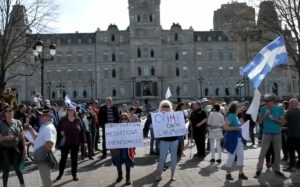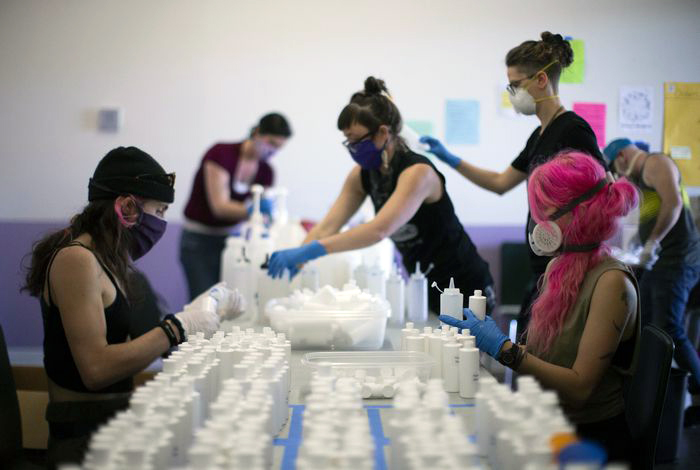
Members of Portland-based anti-fascist collective PopMob and the Rosehip Medic Collective are producing hand sanitizer for distribution in the community.
The pandemic that hit the entire planet full force beginning in January 2020 has, at least temporarily, completely altered the political climate, given that the lockdown and the ban on gatherings mean that social movements cannot default to their traditional tactics, e.g., demonstrations to denounce injustice and propose solutions. Far from being some pause or time out, the pandemic constitutes, among other things, an increasingly intense political situation, during which class relations exhibit their inherent violence at its bluntest. Racialized minorities and poor neighbourhoods experience the carnage at its most brutal, domestic violence rises as the lockdown drags on, the police forces take advantage of the state of emergency to harass and abuse the people they usually target with even greater abandon, people from immigrant communities, particularly Asians, are even more stigmatized than usual, the state issues decree after decree to force large sections of the population to work in unsafe conditions for starvation wages in the name of its sacrosanct economy, and on it goes.
That being said, let’s start by taking a look at how the far right is spending its time during the pandemic before we talk about what the antifascist and antiracist movements are doing.
The Far Right and a Thousand and One Conspiracies
Even if the lockdown means it is quieter than usual, the far right is tripping over itself to advance conspiracy theories, each one more delusional than the last, sometimes even calling for an uprising, i.e., civil war, in the name of “the nation.” Even when largely confined to the social media universe, the brown plague remains toxic.
The far right is particularly susceptible to conspiracy theories and works overtime to spread them. According to one poll conducted in France from March 24 to 26, 2020, for example, 26 percent of the population of France believes that Covid-19 was intentionally manufactured in a laboratory (for a decent overview of the actual origin of the virus, click here). This already significant proportion of the population rises to 38 percent among Rassemblement National voters (RN, formerly the Front National, the main French far-right party). Only 32 percent of the French electorate think that the virus developed and spread naturally.
Similarly, in the US, a Pew Research Center poll conducted from March 10 to 16, 2020, found that 29 percent of the population believe that Covid-19 was manufactured in a Chinese laboratory (23 percent thinking it intentional and 6 percent believing it was an accident). As in France, it is younger and less educated people who are most prone to holding these beliefs. And, as in France, the most conservative sections of the right are the most susceptible: 21percent of Democrats believe the virus was manufactured in a laboratory, as opposed to 37 percent of Republicans, rising to 39 percent among more conservative Republicans.
The far right’s propensity for conspiracy theories is the product of an anti-intellectual and anti-scientific discourse based on the principle that globalist elites are working in the shadows (although some people on the far left share this perspective, the key influence of Marxism and materialist theory within the left means a greater tendency to prioritize structural dynamics and power relations). Furthermore, the far right employs biological metaphors when talking about “the nation,” often casting immigration as the introduction of foreign matter and pathogens —in short, as something akin to a virus. This creates a certain affinity between the far right’s xenophobic discourse and the way it understands the pandemic, essentially seeing the latter as an external threat manipulated by ill-intentioned forces rather than an unfortunate biological development.
Finally, conspiracy theories spread as a result of the contradictions and incoherencies of government policies, as well as the lack of transparency governments develop to conceal their true priorities and the errors they make in managing the pandemic. The grey areas that arise all allow various political actors to advance their prejudices and suspicions and facilitate bridge-building among conspiracy theories, including those surrounding vaccination (i.e., the anti-vaxxers) or 5G telecommunications technology.
These delusions cause the far right to vacillate between paranoia (Covid-19 was manufactured for nefarious purposes) and indifference (Covid-19is not as serious as governments or “globalist” entities like the World Health Organization [WHO] claim). Starting from there, an obvious conclusion is that the pandemic is a huge hoax and a strategic diversion allowing for the imposition of a hidden agenda: e.g., forcibly vaccinating the entire population (something that Bill Gates allegedly promotes), using phoney vaccinations to implant microchips, imposing socialism, or carrying out a coup d’état to install a “globalist” dictatorship.
Instrumentalizing the Pandemic
Whatever their approach, the far-right forces are using the pandemic to once again decry any renewed immigration (alleged to be responsible for the spread of the virus), to demand that the borders be closed, and to glorify “the nation” (the fact being that during the pandemic most of the far-right political forces have simply carried on trumpeting their usual cant, Marine LePen in France and Matteo Salvini in Italy being cases in point.) Meanwhile, in Québec, as we recently wrote, the neo-fascist group Atalante has hung banners with slogans like“ Le Mondialisme Tue” [Globalism Kills] and “Le Vaccin Sera Nationaliste” [The Vaccine Will Be Nationalist]. In harmony with this message, right-wing journalists like Éric Duhaime have also implied that the catastrophic failure of the Legault government to contain the virus is, in fact, the fault of refugees, Duhaime specifically linking the situation in Montreal to the irregular border crossings at Roxham Road.
Other sections of the far right go much further, notably the neo-Nazis influenced by James Mason, including the Atomwaffen Division and other protagonists of the so-called revolutionary “accelerationist” wing, who see Covid-19 as the antidote to the “great replacement” and “white genocide” and hope that the state will collapse, the idea being that this would lead in turn to an ethno-nationalist revival. From this point of view, the virus is seen as a biological weapon that can be used against ethnic and racialized minorities.
Since mid-April 2020, the political instrumentalization of the pandemic has taken on a new form, with the advent and spread of anti-lockdown demonstrations. Although participation has been infinitesimal, these demonstrations have often garnered significant media coverage. In Montréal, there was little interest and the demonstration only drew a handful of imbeciles. In Québec City, however, it did have a somewhat greater resonance. On Saturday, April 25, 2020, around one hundred people gathered outside the Assemblée Nationale to denounce the lockdown, vaccinations, and 5G technology . Then, on May 17, a convoy of between sixty and one hundred people drove from Montreal to Quebec City to protest the lockdown.
During the same period, there have been similar rallies in a number of cities in English Canada . While most of these rallies have primarily attracted people who are not active in the far right, there has been a (so far largely uncoordinated) far-right element that has taken the lead in some localities. In Calgary and Hamilton, members of the decentralized Yellow Vests movement have continued holding their weekly mini protests, integrating Covid-skeptic and anti-lockdown themes into their messaging and in some cases filming hospitals to “prove” that there is no real medical crisis. Meanwhile, in Vancouver, anti-lockdown rallies have included neo-Nazis yelling at passersby, calling them “Chicoms” (a slur for Chinese Communist), traitors, and “libtards”.
 In the US, however, these demonstrations have grown quite a bit larger, benefiting from President Trump’s explicit support, including his use of Twitter to call for the “liberation” of Democratic states that had imposed a strict lockdown. Hundreds of people, in some cases thousands, have participated in car caravans, sometimes demonstrating outside of the legislature in the states in question, even pushing the envelope as far as going into the building armed to the teeth, as was the case in Michigan on Thursday, April 30, 2020. These demonstrations are of a whole cloth with neo-Nazi Timothy Wilson’s failed March 24, 2020, attempt to bomb a hospital in Benton, Missouri, to denounce the city mayor’s lockdown policy. He was killed by the FBI before he could carry out his plan.
In the US, however, these demonstrations have grown quite a bit larger, benefiting from President Trump’s explicit support, including his use of Twitter to call for the “liberation” of Democratic states that had imposed a strict lockdown. Hundreds of people, in some cases thousands, have participated in car caravans, sometimes demonstrating outside of the legislature in the states in question, even pushing the envelope as far as going into the building armed to the teeth, as was the case in Michigan on Thursday, April 30, 2020. These demonstrations are of a whole cloth with neo-Nazi Timothy Wilson’s failed March 24, 2020, attempt to bomb a hospital in Benton, Missouri, to denounce the city mayor’s lockdown policy. He was killed by the FBI before he could carry out his plan.
These anti-lockdown demonstrations, where we find conspiracy theory placards next to anti-immigrant, anti-Semitic, and anti-communist slogans, as well as Nazi flags, offer a meeting place and a potential basis of unity for the conservative right and the far-right. Far from being a spontaneous expression of the despondency caused by the lockdown, they are financed by wealthy families and Republican foundati, including the Dorr family and the Michigan Freedom Fund, which maintains a close relationship with secretary of education Betsy DeVos, et actively supported by conservative organizations like Freedom Works and the Tea Party Patriots, part of the “Save Our Country” coalition.
One organization that has played a central coordinating role in these demonstrations is American Revolution 2.0, which is not only directly tied to the organizations mentioned above but also to far-right websites, a number of which are specifically racist and promote paramilitary organizations like mymilitia.com .
 The vast majority of participants in these anti-lockdown demonstrations are white, which is no accident. The fact is that Covid-19is particularly impacting ethnic and racialized minorities. In a number of US states, African American community and Latinx communities are extremely overrepresented in the infection and death statistics. These numbers directly reflect the historical impact of social and racial inequalities in the US. African American and Latinx minorities are not only affected because they are statistically in worse health and less likely to have health insurance than the white population, but also because they are over-represented in employment sectors that cannot work from home, and are, therefore, more likely to be exposed to the virus. Similarly, centuries of genocidal policies have left Indigenous people particularly vulnerable to this pandemic. In the United States, as in Canada, many Indigenous communities have poor access to clean water and suffer from overcrowding, factors that greatly facilitate the spread of the virus. It is these very factors that are behind tragedies like the Navajo Nation currently having the highest per capita rate of Covid-19 infection in the United States.
The vast majority of participants in these anti-lockdown demonstrations are white, which is no accident. The fact is that Covid-19is particularly impacting ethnic and racialized minorities. In a number of US states, African American community and Latinx communities are extremely overrepresented in the infection and death statistics. These numbers directly reflect the historical impact of social and racial inequalities in the US. African American and Latinx minorities are not only affected because they are statistically in worse health and less likely to have health insurance than the white population, but also because they are over-represented in employment sectors that cannot work from home, and are, therefore, more likely to be exposed to the virus. Similarly, centuries of genocidal policies have left Indigenous people particularly vulnerable to this pandemic. In the United States, as in Canada, many Indigenous communities have poor access to clean water and suffer from overcrowding, factors that greatly facilitate the spread of the virus. It is these very factors that are behind tragedies like the Navajo Nation currently having the highest per capita rate of Covid-19 infection in the United States.
We can, therefore, hypothesize that the whites participating in the anti-lockdown demonstrations do so, in part, because they don’t care about the carnage being experienced by minorities and are unwilling to pay the price necessary to protect them. This sacrificial logic renders the lives of minorities irrelevant. Given the givens, might it not be argued that, in the US, demonstrating against the lockdown is an expression of white privilege? Be that as it may, these demonstrations aid the spread of the virus and, therefore, actually increase the necessity of a lockdown.
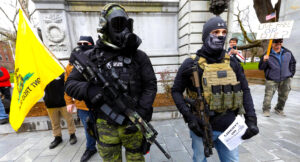 Even if they are not necessarily behind them, far-right organizations see the demonstrations as fertile ground for expanding their influence. They see a way to capitalize on the situation, to clean up their image, to recruit new members, and to influence the post-pandemic era. Having supported the demonstrations on Telegram and Facebook, the far-right Proud Boys have now begun to reframe them on the basis of their visceral hostility to antifascists.
Even if they are not necessarily behind them, far-right organizations see the demonstrations as fertile ground for expanding their influence. They see a way to capitalize on the situation, to clean up their image, to recruit new members, and to influence the post-pandemic era. Having supported the demonstrations on Telegram and Facebook, the far-right Proud Boys have now begun to reframe them on the basis of their visceral hostility to antifascists.
 For example, they described the disruption of anti-lockdown caravans in Denver, Colorado, by nurses as antifascist actions, which from the point of view of the Proud Boys is the equivalent of anti-American. An article published on the Florida Proud Boys website was titled: “Antifa Healthcare Workers Clash with Anti-Lockdown Protesters in Colorado”. Obviously, the Proud Boys don’t know anything about the actual political views of the nurses and don’t really care about the complex issues underlying these socio-political conflicts. They are acting to both delegitimize their adversaries and to contribute to the normalization of a far-right discourse based on dichotomous categories.
For example, they described the disruption of anti-lockdown caravans in Denver, Colorado, by nurses as antifascist actions, which from the point of view of the Proud Boys is the equivalent of anti-American. An article published on the Florida Proud Boys website was titled: “Antifa Healthcare Workers Clash with Anti-Lockdown Protesters in Colorado”. Obviously, the Proud Boys don’t know anything about the actual political views of the nurses and don’t really care about the complex issues underlying these socio-political conflicts. They are acting to both delegitimize their adversaries and to contribute to the normalization of a far-right discourse based on dichotomous categories.
The Proud Boys are adjacent to the networks that have developed a discourse around the concept of a coming second civil war in the US, which they call the “boogaloo,” referencing the 1984 film Breakin’ 2: Electric Boogaloo, which they associate with wearing Hawaiian shirts… Obviously, it’s tempting to just mock this—suffice it to say, it has inspired numerous memes. Nonetheless, Tech Transparency Project, a non-profit that monitors the tech industry, has identified approximately 125 Facebook groups dedicated to the “boogaloo.” More than 60 percent of these groups were created in the last three months, i.e., since the beginning of the pandemic and the lockdown, and thousands of participants are blithely discussing weapons, explosives, military tactics, and civil war.
At this point, the far-right’s strategy does not appear to be bearing fruit. The vast majority of Europe’s far-right parties are stagnating and declining in the polls, and the various radical groupuscules remain marginal. In early May, a majority of public opinion remained favorable to the lockdown, prioritizing public health over the economy. Nonetheless, we shouldn’t underestimate the far-right’s capacity to quickly bounce back once the pandemic is under control and public debate turns to the cost of managing it. A massive rise in unemployment and years of austerity will provide them with a fertile setting. Furthermore, the significant growth of Telegram and Facebook groups associated with the far right testify to the force of attraction of the far-right discourse. That’s not going to disappear with the end of the pandemic. It is easy enough to imagine one pandemic being replaced by another; in this case a pandemic of nationalism and authoritarianism. There’s a reason for the frequent references to a “brown plague” when discussing the rise of fascism in the 1930s.
It is important to note that while the anti-lockdown demonstrations have a pernicious racism to them, the indifference to marginalized social groups has also been crystallized in the largely avoidable widespread death in long-term care facilities. These deaths are of a whole cloth with the open discussion of denying ventilators to disabled people in the event of a shortage. For example, on April 19, CBC reported:
“The Ontario guidelines also recommend withdrawal of ventilator support of those at higher mortality risk, in order to prioritize those at lower risk, depending on the level of scarcity. For example, under the most serious shortage scenario, a 60-year-old patient with moderate Parkinson’s would be refused access to a ventilator or be withdrawn from it in favour of one without this condition.”
Not surprisingly, given that this argument is utilitarian in a way the borders on eugenics, disabled people fear that this would mean they would be denied lifesaving measures if their care threatened the recovery of an able-bodied person. There is much that could be written about what it means about a society when it shows a ready willingness to sacrifice its elders and most vulnerable members at the first sign of crisis. At the very least it indicates an evaluation of human life based on productive capacity that has infiltrated popular thought as neoliberalism has shifted not only our economic and social systems but our very way of understanding the value of life.
For a Safe and Healthy Antiracism and Antifascism
The developments discussed above indicate the importance of continuing to monitor the far right, which means identifying the players involved, tracing the links among them, and documenting their activities, so that we are in a position to act when it becomes necessary. That said, the urgency of the situation created by the pandemic requires that the antifascist movement show solidarity and support and contribute to mutual aid projects. While far-right networks fantasize about using the virus against minorities and are embracing survivalism and stockpiling food and first aid products, far-left and antifascist networks and collectives have established systems for producing and distributing masks and antiviral gels, as well as staffing food banks. These divergent priorities and practices should serve as a rebuke to those people suffering from acute stupidity that for years have blindly repeated the line that the two extremes are simply reflections of one another, the far right and far left simply being two sides of a single coin, and other crap of that sort.
Mutual aid has a long history, stretching back as far as the “natural selection” described by Charles Darwin. In his classic work Mutual Aid: A Factor of Evolution, published as a series of articles in the nineteenth century, the Russian anarchist Peter Kropotkin attempted to demonstrate the central importance of mutual aid for survival and prosperity, not only among humans but for a significant number of species. He wrote:
“The mutual-aid tendency in man has so remote an origin, and is so deeply interwoven with all the past evolution of the human race, that it has been maintained by mankind up to the present time, notwithstanding all vicissitudes of history. It was chiefly evolved during periods of peace and prosperity; but when even the greatest calamities befell men—when whole countries were laid waste by wars, and whole populations were decimated by misery, or groaned under the yoke of tyranny—the same tendency continued to live in the villages and among the poorer classes in the towns; it still kept them together, and in the long run it reacted even upon those ruling, fighting, and devastating minorities which dismissed it as sentimental nonsense.”
The current epoch is not an exception to this rule, and this most recent calamity simply brings us once again face to face with the hardships that humanity has already encountered and overcome numerous times over the course of its history, as well as returning us to the principles that always underlie the solutions developed to address the recurrent challenges: solidarity, cooperation, and mutual aid. In the face of the incompetence exhibited by governments and in opposition to the cruelty proposed by the ruling classes, it is more often than not at a community level that neighbours and autonomous mutual aid networks develop the most effective responses to the difficulties faced by the most vulnerable among us during periods of crisis. This is summed up in the title of a book by the feminist Rebecca Solnit, who was inspired by Kropotkin: A Paradise Built in Hell: The Extraordinary Communities that Arise in Disaster (Penguin 2009); also see her article on the subject published in The Guardian).
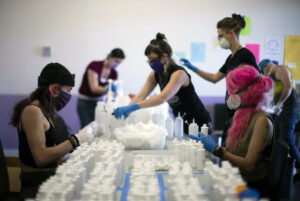
Members of Portland-based anti-fascist collective PopMob are producing hand sanitizer for distribution in the community.
A concrete example among many worth noting would be the work of the antifascist collective PopMob PopMob, in Portland, Oregon, which, working together with the Rosehip Medic Collective, is producing antiviral gel for distribution to frontline workers, to a number of community groups, and in poor neighbourhoods. Their production line, with a team of some ten people, works four to six hours a day, six days a week, at Q Space, an LGBTQ2SIA+ community space. All production is paid for with donations received by the Rosehip Medic Collective and through a GoFundMe campaign. As Effie Baum, a PopMob spokesperson, explains:
“A big part of anti-fascism is community defence and supporting your community. This was a way to provide supplies to communities who had no other way of getting them. There’s a lot of power in people power, community building.”
This reasoning presupposes a redefinition of what we mean by antifascist militancy, one that goes beyond macho clichés that focus on physical confrontation with far-right militants. It means opening our perspective up to genuinely include taking care of others—i.e., the work of “caring”—as part of antifascist action. Radical antifascism is certainly about struggle, but it is also about caring and solidarity.
 Extending this reasoning to the terrain of struggle, another interesting example, this one from Europe, is the People’s Solidarity Brigades, which denounce government neoliberalism while distributing masks, antiviral gel, and food to people in precarious situations and those working on the frontlines. Just as the antifascist movement talks about popular self-defence when responding to the far right, these brigades root their undertaking within the continuity of previous struggles and talk about health and safety as forms of self-defense in the face of the pandemic. Initially formed in Milan, Italy, the brigades rapidly spread to numerous European cities. In France, the idea was taken up by militants in Action antifasciste Paris-banlieue and collectives of undocumented people like the Gilets Noirs and, by early May, counted approximately 750 members in Île-de-France, where the brigades were organized by neighbourhood . As a callout for the creation of brigades in France explains :
Extending this reasoning to the terrain of struggle, another interesting example, this one from Europe, is the People’s Solidarity Brigades, which denounce government neoliberalism while distributing masks, antiviral gel, and food to people in precarious situations and those working on the frontlines. Just as the antifascist movement talks about popular self-defence when responding to the far right, these brigades root their undertaking within the continuity of previous struggles and talk about health and safety as forms of self-defense in the face of the pandemic. Initially formed in Milan, Italy, the brigades rapidly spread to numerous European cities. In France, the idea was taken up by militants in Action antifasciste Paris-banlieue and collectives of undocumented people like the Gilets Noirs and, by early May, counted approximately 750 members in Île-de-France, where the brigades were organized by neighbourhood . As a callout for the creation of brigades in France explains :
“We cannot simply wait passively either for tomorrow or for fresh institutional interventions. We cannot rely on those who are primarily responsible for the dramatic situation we find ourselves in. We cannot trust those who, for far too long, have managed hospitals as businesses that must monetized for maximum profit. No, the state can at best manage the crisis. As in all situations, we must rely on our own initiative.
“. . . [A]s revolutionary activists from the wave of movement over the past few years—from the spring struggle against the labour law to the Yellow Vests insurrection—we saw this disaster coming. Caregivers have been mobilizing for many months to denounce the lack of beds and resources. Workers die every year at work due to lack of protection. Elderly people die in completely unacceptable conditions of isolation devoid of dignity. Everything that we are now seeing in the blinding light of day already existed yesterday, shrouded in media darkness; it is the life of those whom the bourgeoisie and the mainstream media treat as nonexistent—nonexistent for a social organization defined by private interest, profit, and competition, within which an increasingly large section of the population, that without which life itself cannot carry on, counts for nothing. . .
“Given that large-scale measures are undoubtedly necessary, even vital, we urgently need to vastly increase the level of autonomous popular organization to give substance to the watchword of self-defence, i.e., we must immediately begin working in solidarity for and with the populations most affected by the crisis, those who are of no structural interest to the state. To do so, we must also remove the question of care from the private sphere within which it has been confined for centuries just as it has been determined by a gendered and racialized hierarchy, and make it the springboard for rethinking our collective organization and our social reproduction.
“Our task in this context is not to replace humanitarian organizations but to orient the already existing disparate groups and those that have sprung up since the announcement of the lockdown around common objectives—in short, to put them on a politically antagonistic trajectory that assumes a break with the existing capitalist order as the strategic objective, with popular self-organization on a territorial basis as the origin of effective counterpower. . . . The solidarity we are talking about is not an empty principle meant to transcend antagonisms but, rather, something that will allow us to strengthen our offensive capacity. . .
“Self-defense from below, based on elements of mutual aid, with a particular focus on people in extremely precarious situations and those who are the victims of isolation and repression calls into question the idea that the defense of our communities can only be ensured by the establishment.
“This health-related self-defence should not, therefore, constitute a perspective of struggle limited to the duration of the epidemic emergency, and even less should it be thought of as a sectoral struggle. . . . Our “health and safety” self-defence is, as such, actually popular self-defence, in that it constitutes the opportunity to rethink our relationship to the modalities of social reproduction as a whole, that is to say, to the organized way that day in and day out, we produce and reproduce our lives. In that light, we must also question ourselves about the nature of the life we would like to join together to produce.
“Resistance is vital!”
 In many cities, antifascists are at the heart of these projects, helping to build alliances with other autonomous groups within the far left. For example, in Lyon, the Groupe antifasciste Lyon et environ (GALE) has allied with anti-gentrification collectives like La Guillotière n’est pas à vendre and l’Espace communal de la Guillotière. Telegram threads were quickly established, with a telephone number to be called, and there is thread on Discord to coordinate collecting and distributing food . Or, to offer another example, in Switzerland, Action Antifasciste Genève and the Jeunes Révolutionnaires Genève created the Geneva People’s Solidarity Brigade – Yvan Leyvraz in memory of an international brigade member assassinated in Nicaragua in 1986.
In many cities, antifascists are at the heart of these projects, helping to build alliances with other autonomous groups within the far left. For example, in Lyon, the Groupe antifasciste Lyon et environ (GALE) has allied with anti-gentrification collectives like La Guillotière n’est pas à vendre and l’Espace communal de la Guillotière. Telegram threads were quickly established, with a telephone number to be called, and there is thread on Discord to coordinate collecting and distributing food . Or, to offer another example, in Switzerland, Action Antifasciste Genève and the Jeunes Révolutionnaires Genève created the Geneva People’s Solidarity Brigade – Yvan Leyvraz in memory of an international brigade member assassinated in Nicaragua in 1986.

Members of the Cooperation Jackson solidarity network, in Mississippi, produce 3D-printed masks for community distribution.
Beyond antifascist groups, left-wing forces in racialized communities have taken the lead in filling the vacuum created by Trump’s policies of neglect. In Mississippi, Cooperation Jackson, a cooperative network of groups in the state’s capital city, with its roots in the New Afrikan nationalist movement, has been working for many years to establish an economic basis for autonomy from racist state and federal governments. As early as April, Cooperation Jackson was producing both hand-sewn and 3D-printed masks for community distribution. Other communist and nationalist organizations within Black and Brown communities across the US have similarly been providing free PPE and organizing food distribution to vulnerable members of the community.
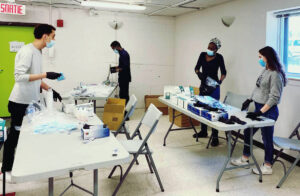
Members of the Hoodstock collective, in Montreal North, are putting together health kits for community distribution.
In Montréal, while many antifascist militants are directly involved in the various mutual aid networks on an individual basis, one of the key autonomous initiatives was developed by Hoodstock, an antiracist collective in the poor Montréal North neighbourhood, which has been particularly hard hit by the pandemic. Primarily focussed on the distribution of health and safety products and food to those in need, the Hoodstock campaign, nonetheless, explicitly places itself within the larger struggle for equality and social justice, as its callout makes clear :
“A health and safety crisis like the one we are currently experiencing shines a dramatic light on the systemic inequalities experienced by the population in Montréal North. Our borough is characterized by social problems that the authorities should have noticed sooner: insufficient health services and social services, food deserts, underfunded community organizations, a lack of alternatives to public transit, a lack of internet access, rundown housing, etc. Furthermore, Montréal North has an extremely high population density, which favours the spread of a virus. That’s why Hoodstock is taking action.”
 Also in Montréal, our comrades at Solidarity Across Borders, who ceaselessly denounce the detention centers for migrants, organized a caravan on April 19, 2020, to demand immediate freedom for all those being detained and status for all migrants . Imprisoning migrants is always unacceptable, but this is even more the case during the Covid-19 pandemic. In a similar vein, Solidarity Across Borders launched a fundraising campaign to support people without papers and help them to safely lock down during the pandemic:
Also in Montréal, our comrades at Solidarity Across Borders, who ceaselessly denounce the detention centers for migrants, organized a caravan on April 19, 2020, to demand immediate freedom for all those being detained and status for all migrants . Imprisoning migrants is always unacceptable, but this is even more the case during the Covid-19 pandemic. In a similar vein, Solidarity Across Borders launched a fundraising campaign to support people without papers and help them to safely lock down during the pandemic:
“Our current system discriminates against migrants based on their immigration status, but the virus does not. If the recommended measures of physical distancing and self-isolation are to be effective, they must be accessible to all. This discrimination is untenable and cruel, as it puts an undue burden on the most vulnerable members of our community to contribute to the health and well-being of us all. Asking someone without status to make a choice between no longer being able to pay for their basic necessities or continuing to work is devastatingly unfair. And ultimately, this system puts us all at risk. The health of undocumented and precarious workers is the health of everyone, our lives are interconnected.”
This sort of campaign reminds us that respecting the lockdown and preventing the exacerbation of the pandemic requires specific social conditions. In short, it reminds us that health and safety issues are inseparable from social issues in general.
Beyond local specificities, the priorities are the same everywhere: find and distribute health and safety products, masks and gloves, non-perishable foodstuffs, books and toys, computers, etc. It is not simply of matter of responding to the pandemic with self-organization and mutual aid. Our response must also be political in nature, laying the groundwork for the struggles that will follow the end of the pandemic. We must also act to occupy the terrain and isolate the far-right forces, to make their post-lockdown remobilization efforts more difficult.
The political dimension can sometimes mean that particular mutual aid efforts are met with police repression. For example, On May 1, 2020, members of the People’s Solidarity Brigade in Brigade Montreuil, east of Paris, were kettled and harassed by the police while distributing food baskets; almost all of them were fined for “demonstrating.” It’s worth noting in passing that Amnesty International has denounced illegal practices on the part of the French police during the lockdown, in particular, the illegal use of force, the use of dangerous intervention techniques, making racist statements, and the excess of controls in certain neighbourhoods (poor neighbourhoods are obviously subjected to greater control than bourgeois neighbourhoods). A similar situation has also been denounced in Montréal.
Some Thoughts About What Comes After the Pandemic
Given the nature of the pandemic, it’s hard to really imagine what will come after it, but we can nonetheless offer a few observations. To begin with, the stratospheric amounts spent to stabilize major corporations and, although much less so, to support the numerous people who have lost their jobs because of the lockdown, as well as the profound economic crisis that has already begun, mean that we can anticipate a brutal backlash in the months and years to come. All the rainbows in the world won’t protect populations that are already in a vulnerable and precarious situation because of aggressive austerity policies. The mutual aid networks that have appeared in recent months are essential and will be called upon to play a role in the post-pandemic period. As stated in the People’s Solidarity Brigades’ statement quoted above, defending our health and safety must go beyond the pandemic and the specific issues it raises to challenge the system of social reproduction and capitalism itself. Tomorrow, more than ever, our antifascism must be anti-capitalist!
The pandemic has also made it very clear just how dependent our societies are on the work of women, racialized people, and immigrants for their very survival. While the far right delights in macho fantasies and sees women as weak creatures who could not survive without men to protect them, it is precisely these women who are in the trenches of this pandemic, who do the essential work to keep our health care system afloat, and who pay the price for doing so. Furthermore, contrary to most of the world, in Québec, Covid-19 is hitting women harder than men; according to the Institut national de la santé publique du Québec (INSPQ), in early May 2020, women constituted 60 percent of infections and 54 of death. In the aftermath of the pandemic, it would be completely unacceptable for women to once again have their key contributions rendered invisible and their work devalued. Struggling for women’s work to be recognized is not only indispensable because it is just but is also necessary if we seek to prevent right-wing conservatives and the far right from reducing women’s liberation to a question of secularism, while downplaying the social and material dimensions of equal rights.
Similarly, while nationalists of every stripe talk ceaselessly about closing the borders, it is people who have immigrated who are in the frontlines at the hospitals, in the long-term care centres, and at the supermarkets, allowing the rest of us to lock down. Nonetheless, we’ve yet to hear any government acknowledge the benefits we gain from immigration and undocumented people during their daily press scrums, and, until we get some indication to the contrary, there’s no reason to believe that these “guardian angels” won’t be deported once the pandemic is under control. The independent MNA Catherine Fournier tabled a motion calling upon the Assemblée Nationale to recognize “the contribution of hundreds of asylum seekers, primarily of Haitian origin, who are currently working as health care attendants in Québec’s CHSLDs.” Fournier has also called upon the Canadian government “to quickly normalize their immigration status”, receiving majority support from all parties except the CAQ. Asked about this at a later press conference, François Legault disingenuously sidestepped the issue by suggesting that journalists not “confuse the separate issues of refugees, people who cross at Roxham Road, and the Haitian community”. Far from separate, these issues are, of course, intimately interconnected. [EDIT: Following widespread public outcry, on May 25th, Legault announced that his government was willing to “consider” allowing those workers to apply as immigrants rather than asylum seekers.]
It is incumbent upon us, beginning now, but, above all, continuing after the pandemic, to consistently stress both the benefits and the necessity of immigration. Faced with governments and nationalist forces that instrumentalize immigration for economic and/or electoral purposes, we must work to broaden the antiracist and antifascist front to effectively demand freedom of movement regardless of market needs and the mass normalization of status for both those with irregular status and non-status people.
We must also anticipate an ongoing concentration of state power in the name of controlling the pandemic, using emergency measures and instituting various far-reaching mechanisms for monitoring the population. While the identification and tracking of infected people can play an important role in preventing epidemics, we nonetheless seriously doubt that states and multinationals will use the data and information in a sound and disinterested way, but instead anticipate that they will use it control the population under the guise of addressing health and safety issues, which makes the struggle to maintain autonomous spaces beyond the scope of surveillance absolutely essential.
Finally, as it is likely the spectre of Covid-19 will return regularly to haunt us and that certain social distancing measures will remain in place for many months to come, possibly even many years, we need to find new ways of organizing and disrupting the dominant social order’s business as usual.



